Imagine:
You’re a single mother.
You’re a single mother living in a developing country.
You’re a single mother living in a developing country and you support your family on a dollar a day.
You’re a single mother living in a developing country. You support your family on a dollar a day and don’t have access to healthcare or basic medical necessities.
You’re a single mother living in a developing country. You support your family on a dollar a day, don’t have access to healthcare or basic medical necessities and just developed cervical cancer – a treatable and preventable disease that has an 85% mortality rate in developing countries.
Imagine.
The fear. The panic. What would you do?
Most of us could never even fathom being in this situation, but for countless others, this nightmare is all too real.
Like so many other women in Nicaragua, Anielka Medina Escoto’s family was directly impacted by cervical cancer. Just after graduating high school, she experienced her 48-year-old mother’s excruciating battle and death from this preventable disease.
As tragic as Anielka’s story is, she is not alone. Nicaragua has the highest cervical cancer mortality rate in the Americas both due to its inadequate health care system (PAP screening is available to less than 10% of women) and prevailing “machista” behaviors that propagate HPV, the cause of cervical cancer.
It is estimated that women, without a spouse or partner, head up 40% of households in Nicaragua. Cervical cancer, a disease that is very treatable and preventable in countries like the United States, contributes to more than 85% of cancer-related deaths in developing countries, like Nicaragua.
Cervical cancer destroys families and leaves children on their own, with extended family, or at the care of the community. Without a father, without a mother, without a home, the children are often alone in a seemingly endless cycle of poverty and despair.
Fortunately, Anielka’s story didn’t end the way most do. Through strength, courage and a desire to help others, Anielka earned a scholarship to university (UNAN), trained in cervical cancer prevention, and co-founded The Lily Project with partners Jonathan Butcher and Susan Cotton.
The Lily Project was founded on a simple belief; every person has a right to health - not just the absence of disease, but also a state of complete physical, mental and social well being.
The team is working to become the most trusted provider of health services for women and girls living in rural communities, and prevent cervical cancer for more than 200,000 impoverished women.
It is because of these beliefs and efforts that we teamed up with The Lily Project for our first annual free treatment and screening event on Dec. 10 in order to educate and empower over 100 women and mothers. Burke Agro understands that women are the heart and soul of their families and communities, because single mothers are also the strength of ours.
Sol Simple, the face Burke Agro’s retail and commercial products, employs hundreds of single mothers in marginalized communities in an effort to advance the overall well being of women and their families in Nicaragua. We coordinate directly with local government, educational institutions and international developmental agencies to provide these women with the skills and means to better their lives and surroundings.
To learn more about The Lily Project and its mission, please visit:www.thelilyproject.org
You can learn more about Sol Simple at: solsimple.com





